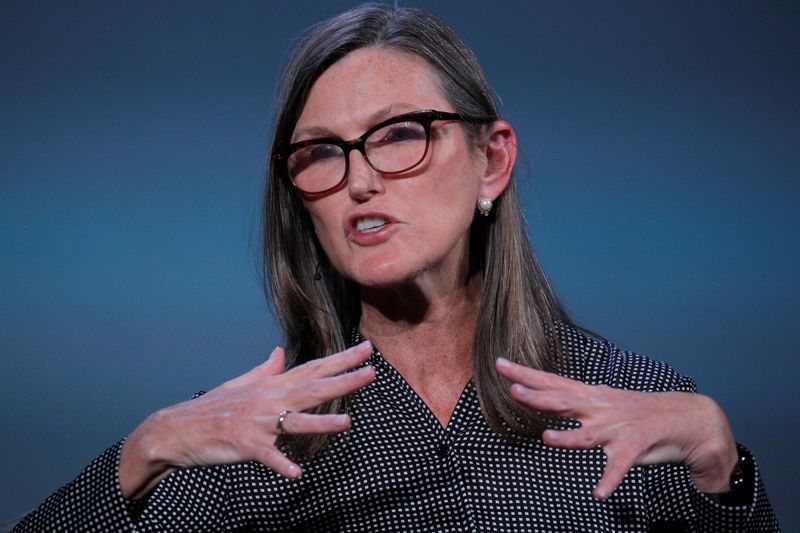(Bloomberg) -- Cathie Wood’s flagship exchange-traded fund peaked on Feb. 16, 2021. One year and a 53% drop later, there could still be plenty of pain ahead for her beloved disruptive-tech chasing strategy.
The ARK Innovation ETF (NYSE:ARKK) has stabilized since a precipitous decline last month -- it’s roughly flat in February -- but the headwinds facing its speculative growth picks are only growing. Not only are yields rising as investors prepare for the Federal Reserve to raise interest rates -- bad news for unprofitable companies -- but the economic reopening is hammering many of the businesses which thrived in the pandemic.
Top ARKK holdings like Roku (NASDAQ:ROKU) Inc., Teladoc (NYSE:TDOC) Health Inc. and Zoom Video Communications (NASDAQ:ZM) Inc. -- winners in the work-from-home era -- are down as much as 74% in the past 12 months.
Small wonder short bets against ARKK jumped to a fresh record of 11.4% of shares outstanding this week, according to data from IHS Markit Ltd. The Tuttle Capital Short Innovation ETF (NASDAQ:SARK), which famously delivers the inverse of ARKK’s performance, now has more than $300 million in assets.
“Those stocks are supported by speculation and when the Fed is raising rates, speculation doesn’t pay as much,” said Brent Schutte, chief investment strategist at Northwestern Mutual Wealth Management Co. “A lot of what’s happening in the market reminds me of what happened in the late 1990s, where parts of the market were bid up to levels based upon what people thought they’d be in the future.”
Parallels with that era and the dot-com bust that followed are increasingly used in discussions of ARKK because its price chart is eerily similar to that of the Nasdaq index of tech stocks more than two decades ago.
“Today marks the 253rd trading day from ARKK’s all-time high and on the same day in 2001 the Nasdaq was down 60% from its dot-com bubble peak,” Jessica Rabe, co-founder of DataTrek Reserach, wrote in a Tuesday note. “If the 2000/2001 analog continues, we can expect ARKK to continue trending lower over the next three weeks. The Nasdaq dropped 18.7% over the following 16 trading days.”
The good news for investors and Wood is that there could be some temporary relief after that. Back in 2001 the Nasdaq then rallied 41% over the course of around six weeks, before resuming its declines.
A spokesperson for Wood’s ARK Investment Management didn’t respond to a request for comment.
Working in ARKK’s favor: Most of its $15 billion decline in assets has stemmed from performance. Since it hit an intraday high of $159.70 a year ago Wednesday, investors have pulled only about $465 million from the fund, and ARKK’s net flows in 2022 are actually positive despite a more than 20% slump.
This remarkable loyalty helps prevent a greater unwind, and buys Wood’s strategy time to rebound. The star manager has kept conviction in many top picks and continuously stressed that her funds have a five-year investment horizon.
But to Schutte, the downturn makes sense because so many of its biggest bets, like Teladoc and Zoom, are getting less relevant as Covid ebbs.
“During the pandemic there were all kinds of questions about what would become of society, how would we go about life after the pandemic,” he said. “You attracted new investors into the market who were more about ‘what are the themes of the future that I should invest in’? And I just think you’ve had a wash out of that.”
©2022 Bloomberg L.P.
